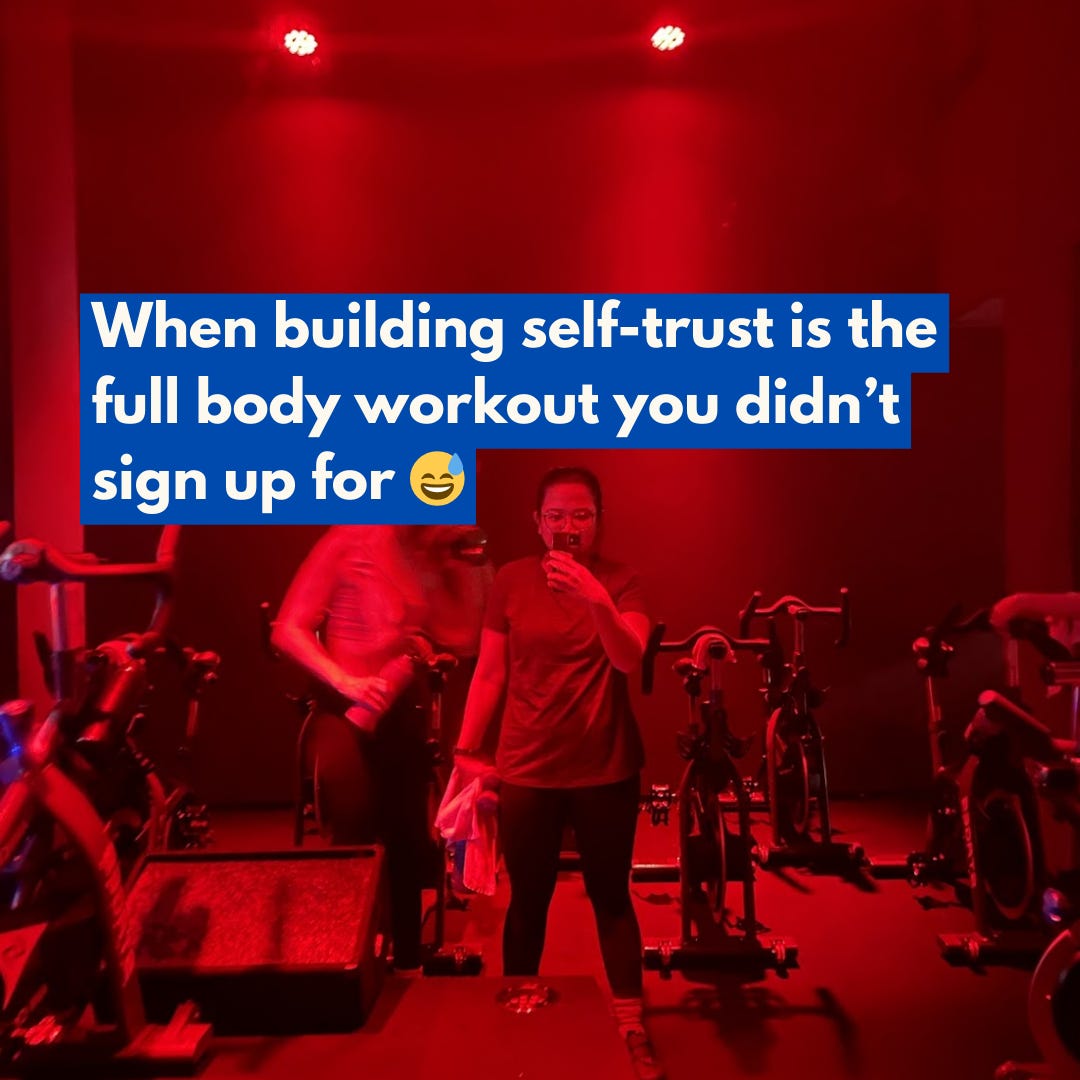#69: Self-Trust as a Strategy (The SaaS that matters)
The one thing no AI tool can automate for us yet
Hola Friends 👋!
Before burning out and getting kicked out of my corporate employment, I was the Head of Product for a 100+ people organization working on the domain of Trust.
And if there’s anything I learned in the years I was working on the topic it’s this:
Trust is a decision.
We can’t make people trust us. We can only give them evidence that they can.
But ultimately, the choice is theirs.
So even if you are the most credible, reliable, empathetic person in the world, and they’ve known you for years, if they still don’t want to trust you. They won’t.
And it can take a million reasons to earn somebody’s trust.
And only one to break it.
And the same works for building trust with ourselves.
Trying to earn our own trust
We tell ourselves:
Once I have learned all the skills, I’ll feel confident.
Once I’ve gotten the title or the role, I’ll believe I’m good enough.
Once I’ve accomplished so many things, I’ll believe I can have an impact.
We treat self-trust as a reward. Something we earn after we’ve proven ourselves to… ourselves.
But the problem with this approach is that there’s so much dependency; the milestone we’re looking for is always just a probability. And even if the milestone does happen, the goal post always seems to be moving.
So even if we’ve given ourselves so much evidence to trust ourselves, our capabilities, our capacity, if we’re afraid to do so, then we don’t.
There will always be one more milestone to achieve first before we believe we can feel confident, good enough, or have an impact. Rinse and repeat.
Self-Trust is hard
But before we talk about flipping this pattern, it’s worth calling out why trusting ourselves can be so hard.
Because it requires more than just a mindset shift (and that’s already difficult on its own).
Self-trust is a muscle we have to train, even on the days when we’d rather choose what feels easy.
Why is it hard?
Because the stakes feel high. We worry about what happens if we’re wrong.
And if things go wrong, it feels like we can’t go back from it.
Because doing the hard thing means letting go of certainty, and by default, we avoid uncertainty.
But this is precisely why it’s worth doing.
Because the more we practice, the more our capacity grows. And the more we can trust ourselves to figure things out, even when the path is unclear.
Self-trust is not binary
And just to be clear, self-trust isn’t a one-time decision.
It’s not a single, epic moment of courage.
Sometimes we have it, sometimes we don’t.
Sometimes it’s strong, sometimes it needs 3 mugs of coffee before noon.
It’s not a single choice to be made. It’s a consistent practice, one uncomfortable decision at a time.
When Self-Trust is having a good day:
I remember being so surprised with myself when I said no to an opportunity in my old job. Knowing that saying NO will have consequences. But the cost of saying YES felt bigger.
So I trusted what my intuition was saying. I trusted that I am capable of bouncing back regardless of the consequences. I trusted myself to make the right decision. So I did.
And you know the story. I got laid off.
But if I may so myself, everything turned out so much better than I could have imagined.
When Self-Trust is NOT having a good day:
It was in the day-to-day when the lack of trust showed up. And cost was high.
“How can I coach Product Leaders and functional experts in tech when I’m no longer working as one? Losing the title felt like I lost my credibility too.”
And this is where I caught myself falling into an old pattern, the one where I tried to earn my own trust through external validation.
A confession
Summer 2024, a few months after getting fired, I was already questioning whether or not I had the chops to be a coach for PMs and Product Leaders. (Never mind that I have been doing it for years at this point)
I was getting leads, having discovery calls, but nobody was clicking.
Every call felt like a performance, and my friends, I was tanking the reviews.
In hindsight, it was indeed a performance. I was so busy trying to compensate for the lack of title, trying to prove that I am qualified to help, that I forgot to do the real work. The more I tried to prove, the more I drove away potential clients.
It was exasperating. And I honestly wanted to give up. I considered just taking the rest of the year off and going back to my corporate tech life in the new year (half serious but not quite.)
But there was one more call on my calendar. One last chance to “impress”.
But since I was ready to raise the white flag, I just I told myself to fuck it.
I wasn’t going to let go of all expectations, so there was zero pressure to close. And if I didn’t have the pressure to close, then I didn’t need to prove anything.
So I stopped looking at it as a “sales call”. And just focused on wanting to help.
And that I know I can do.
By the time the call ended, I had a new client.
And also a reminder:
Self-trust isn’t the result of success. It’s the foundation for it.
It’s not something we earn after we’ve proven ourselves. It’s what makes the proof possible in the first place.
A pattern I see all the time in the real world
And it’s not just me. I see it all the time with my clients when we first start working together:
The Over-Preparer: The aspiring Product Leader who kept taking courses, hoping a new certification would make her feel credible enough to apply for senior roles.
There was always something she needed to know how to do first before she could feel ready. But every new course just moved the goalpost. Because the context for leadership is always different everywhere, everyday.
The Hesitant Leader: The senior leader who kept doubting her capacity to lead because her style didn’t look like everyone else’s. She didn’t speak the loudest in meetings or had a million ideas per second. She thought that meant she was less capable.
So she held back, hesitated to share her thoughts, and resisted making the changes she knew would bring the results her team needed. It wasn’t that she lacked ideas. It was that she lacked the self-trust to act on them.
🧠 Reflection pause:
Was there an opportunity that you wished you trusted yourself more and took a chance on? When Self-Trust comes first
But when they finally flip the script and realize that the decision to trust was theirs to make, true empowerment comes in.
Choosing stability on their own terms: One client took a stable, “less sexy” role, not because it was her dream job, but because it gave her the bandwidth to figure out what she truly wanted next. She didn’t worry about how it might look on her CV or what it might signal to future employers.
Instead, she trusted herself to use the role as a platform for clarity and momentum. She’s now creating opportunities for herself in ways she hadn’t even considered were possible for her.
Saying yes before feeling 100% ready: Another client got tapped to try out for a Product Lead role just two months into a new company. She said yes. Not because she felt fully ready, it was the opposite. She didn’t feel ready at all. But she trusted her ability to learn fast, adapt as needed, and gain the tools that she would need along the way.
So she chose to bet on herself despite the doubt that was gnawing at the edges of her brain. As of writing, the process is still ongoing. But she’s already secured senior leadership backing.
Both of these clients made moves without guarantees, without waiting for someone else to clear the path. They chose to trust themselves first, and the results have been more expansive than just a title change.
They’re building careers that feel more aligned, more authentic, and more theirs.
🧠 Reflection pause:
When was the last time you trusted yourself to make a hard decision, even when you didn't truly feel ready, or have everything figured out?
How did that feel?Build trust, don’t earn it
Trusting ourselves” is easier said than done, especially when there are days when it feels like the world is just handing us evidence that we shouldn’t. I get it. I promise.
It’s because self-trust is a muscle we build every time we choose to back ourselves, even when the definition of “hard” keeps changing.
It’s the small, everyday choices that stack up over time to create real, lasting impact:
Declining meeting invites because we trust our priorities, even when the meeting feels “important” and FOMO creeps in. (FOMO over a meeting exists, I swear)
Pushing back on a bad idea, even when it comes from someone with more seniority, and not taking it personally if our voice is overridden.
Being the person who asks the difficult question in a company all-hands, even when our voice shakes.
Taking a break, even when our to-do list is still long.
Asking for a raise or a promotion, even if we feel like the timing isn’t perfect.
And these choices are a reminder that we have more autonomy than we thought we did and a declaration that we believe in ourselves and our ability to figure things out, even if the outcomes aren’t guaranteed.
And this matters because when we trust ourselves:
We make decisions more clearly and quickly.
We take bigger swings. We stop waiting for perfect timing and just move.
We bounce back faster from setbacks, responding to the situation rather than wasting time spiraling.
Sometimes, trusting ourselves means knowing when to ask for help. When to invest in our own growth, even if it feels like an indulgence. When to lean on others without letting it undermine our belief in ourselves.
💡 If you’re ready to stop waiting for the perfect conditions and start building the career (and life) you actually want, I’d love to support you.
Let’s chat about how you can strengthen your self-trust muscles and move with more clarity, confidence, and conviction.
🔗 Click here to book a callTL;DR: Self-Trust as a Career Strategy
We often treat self-trust like a reward. Something we have to earn through milestones, approvals, so we can prove our worth.
But in reality, self-trust isn’t earned, it’s built on the decisions that we make over and over, even on the days when the ideal results feel impossible to achieve, and the self-doubt is loud.
It’s the foundation for the big, bold moves we want to make, built on the muscles we’ve strengthened through the daily, seemingly small choices we make to back ourselves.
The quiet “no” to a meeting that doesn’t serve our priorities.
The pushback on a bad idea, even if it comes from someone more senior.
The courage to speak up in big spaces even when we’re feeling small.
And sometimes, it’s knowing when to ask for help
When we choose to trust ourselves first, we stop waiting for the perfect conditions and start creating them for ourselves.
🧠 Reflection pause:
If you trusted yourself 5% more today, what would you be doing more of? And what would you finally let go of?📌 Coaching Bulletin Board:
📌 From Stuck to Expansive: The Full Journey is an 8-week program for people who want to be career-ready before the next shift hits. Whether you’re feeling the itch to move, wondering what’s next, or simply tired of waiting for the system to reward you, this is your space to build your career stack with clarity and confidence.
We start on May 21. Enrollment closes on May 19.
📌 1:1 Coaching for the new Product, UX, and Tech Leaders going through career dilemmas. If this is you, I’d love to help you define your strategies to set yourself and your team up for success. Book a free call and let’s discuss how we can work together.
If you’ve always wanted to work with a coach, but budget is a constraint, we can talk about how you can work with me for free through Inciteful :)
📌 Magical Audios is partnering up with companies to provide stronger and more effective support to their leadership teams so they can lead with presence, confidence, and resilience. If you would like to know how this can work for your organization, please don’t hesitate to reach out.
If you got to this part of this newsletter, thanks for staying with me until the end. And thank you for sharing with me topics that you’d like for me to share my thoughts, feelings, and violent reactions on.
❤️
Kax






"The pushback on a bad idea, even if it comes from someone more senior."
This one is so hard for many of us but often times when we're the expert of a thing we know why the senior leaders idea is dumb.
I...mean..."not as impactful as they think it will be and should probably be delivered at a later date."